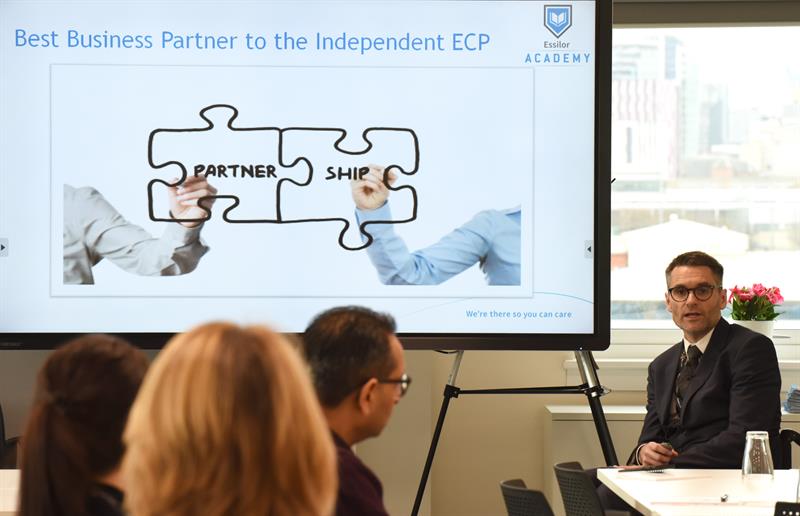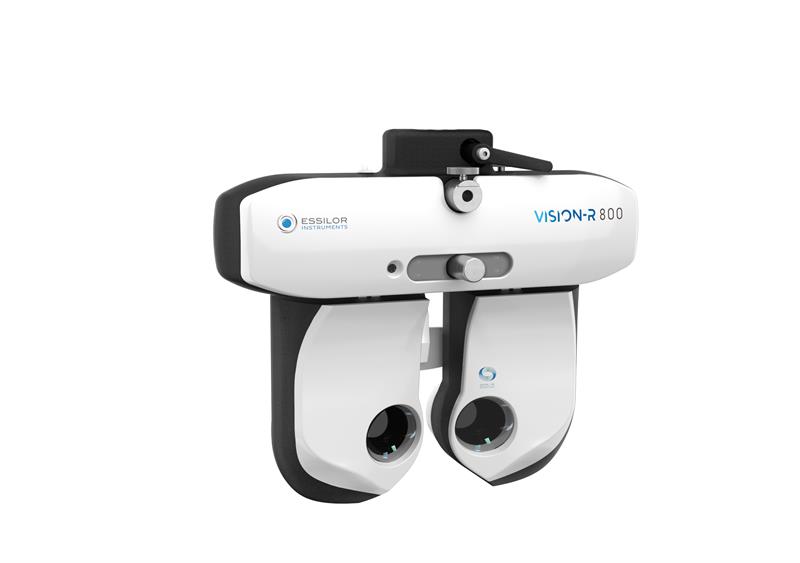
Optician’s interview with Essilor UK managing director Tim Precious highlights the difficult job senior management figures at subsidiaries of multinational companies can have.
Just a couple of days before Optician was due to sit down with Precious at the company’s UK headquarters in Thornbury, news broke that Essilor’s parent company, EssilorLuxottica, was in talks with HAL Holdings to buy a majority stake in Dutch retailer Grandvision – which owns Vision Express in the UK.
Although the acquisition had not been confirmed at the time, that the two companies had issued statements saying talks were taking place meant there was a pretty good chance it was going to happen.
The timing could have been better, certainly from Precious’s perspective, but for Optician it was a perfect chance to get some early reaction to a deal which would not sit well with independent opticians.
‘I don’t really see much changing,’ says Precious. ‘If anything, the news makes us [Essilor UK] more resolved to invest more. We’re already looking at different ways to accelerate some of the plans we had in place – such as digital search activity and leading patients to practices.’
Precious says he expects to be questioned intensely by independent partners but believes Essilor UK has insulated itself successfully from wider group level merger and buyout announcements. ‘We’ve navigated a lot of news which has come out in the press over the past few years, because we continue to live by what we are saying – investment in independents. We still have a very loyal customer base that we have worked with for many years with really good relationships. Independents account for over 30% of the value in the market. It makes sense for us to really nurture the sector.’
One of the ways Essilor UK wants to nurture its independent customer base is to offer them an exclusive suite of products and equipment – segmenting independents from the rest of the market and importantly multiples like Vision Express. ‘We’re launching a lens pilot towards the end of the year for a product named Advanced Vision Accuracy, with lenses that can be produced with accuracy to 0.1D, that will leverage the benefits of the new Vision R800 refraction unit. Both will be exclusives for independents,’ he says.
Return to the UK
Precious has more than 20 years’ experience with Essilor in two separate spells and in different parts of Europe, so he has seen the optometric retail sector evolve from several perspectives.
Initially working as a financial controller, he joined Essilor UK in 1999 before taking a break to go travelling and subsequently spent some time in the insurance industry. He returned to Essilor UK in 2005 as director of finance, a role he says gave him his first real exposure to the company’s customers.
During his second spell, Essilor UK went through a sustained period of mergers and acquisitions, especially in the ophthalmic lab sector with purchases of Sinclair, Horizon and WLC. He was also tasked with managing Essilor’s business in Ireland and a major sales software rollout.
Before joining Essilor UK in late 2018, Precious headed up Essilor’s Nordics division. So how do British and Nordic territories compare? ‘It’s quite a mature market, even more mature than the UK in terms of the balance between independents and chains, Specsavers, Grandvision and Synsam, which each have anywhere between 20 and 30% market share between them,’ he says.
‘Where there is a big difference is that independents have really joined forces and there are prominent buying groups. Nordic Optical Alliance and Nordic Vision Retail have roughly 400 stores within their buying group and they limit the suppliers the opticians can use, yet the stores still act as independent to a certain degree. It’s a kind of “quasi-control,” I would call it, but working with them is a challenge for wholesale suppliers like Essilor.’
Generation X
With the rise of online retail and ‘clicks and mortar’ high street disruptors like Ace & Tate and Ollie Quinn, opticians are finding it increasingly difficult to reach the youth market. This is something Precious says Essilor is acutely aware of.
‘In my first eight months back I’ve been trying to visit a lot of customers, as well as spending time here in the office and you do certainly hear that from them. I think it’s a dynamic that’s been there for a few years actually.
‘We’re invested in growing our businesses, but we do definitely see that in order to do that, we need to drive footfall. Over the course of this year, we’ve been investing heavily in our digital media and marketing teams and we’re looking at the best ways we can help drive traffic to those stores.
‘It’s about having a comprehensive national media campaign in optics which includes unique digital drive to store solutions, SEO and geolocation marketing initiatives that help independents attract new footfall.’
Precious’s time in the Nordics also opened his eyes to the marked difference in the youth market. ‘I think 75% of people under 30 buy pretty much everything online in Sweden, and it’s a demographic that’s not going to change,’ he says.
 The Essilor Optical Academy is one of the ways the company supports independent business
The Essilor Optical Academy is one of the ways the company supports independent business
But purchasing behaviour only tells part of the story. ‘A lot of people search online then go elsewhere. Glasses Direct is a group company of Essilor, but it has a high drop off rate. We know that the digital consumer often buys more, and buys more frequently, and looks for information online before visiting the high street. Our new digital strategies will capture them and signpost them to our partners through optician-finder portals. We are creating richer content, supported by independent experts, to answer the most pressing eye-health questions.’
Some businesses have implemented new approaches to digital. ‘I was with a customer in London recently who has 11 practices in London and the south-east, and he’s developed a new website strategy,’ says Precious. ‘He’s trying to get people to visit online and convert them to offline customers. Users can look at the frame brands and see a broader selection in the practice. And of course, when they do visit, the practices can offer them a higher quality of eye care, which I firmly believe independents do.’
To build on this higher level of care, Precious believes independents need to be more visible online to build significant additional footfall, but he also understands the pressures on business owners. ‘It’s hard to be optician, accountant, HR and digital marketing guru,’ he says.
‘Our expanding digital team helps opticians exploit every digital opportunity, like developing their own digital solutions and web presences as extensions of their own stores, to capture new customers and serve existing ones better, and exploit SEO and key word campaigns. Our SEO strategists are building real digital connection and outreach. We already have millions of UK consumer hits on our eye-health websites, but we intend to make this even stronger and capture new markets.’
Future-proofing
Precious says his vision to future-proof independents goes beyond lens quality, in which Essilor says it has invested so heavily. ‘It is down to the quality of the care you and your staff give. Get it right and you enhance the experience for each customer and really improve lives through vision, and that can build life-long loyalty for entire families.
 Vision-R 800
Vision-R 800
Close to home
A long and varied career with Essilor means that coming home to Thornbury has been a good opportunity for Precious to really appreciate the UK workforce. As a result, he has launched an internal communications campaign to ensure that colleagues in Thornbury celebrate their achievements.
‘We have a very loyal workforce, and a very stable team, and that’s great for continuity. But we sometimes forget that we are being such a force for good in education, in shaping policy, in helping each and every independent partner, in product innovation and marketing prowess,’ he says.
‘I tell them to step back from the daily deadlines, look at what they have achieved and take pride that they are helping to improve lives through vision, every day. Our internal message is to be number one in everything that we do, to make a difference.’
Another campaign that he says is extremely personal to him is the right to a good school education and the link between vision problems and low achievement. ‘I know this link too well through the work of my school teacher wife, who teaches in less privileged areas. We all know that children who fail to be diagnosed with vision problems can easily fall behind over the next three years, we intend to work with over 50 UK schools to ensure their pupils have better life chances.’
